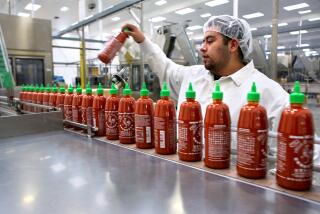Hepatitis Drug Shortage Intensifies : Medicine: Military needs, stockpiling cut into already thin commercial supplies. New deployment adds to the pressure.
- Share via
WASHINGTON — U.S. health officials voiced concern Friday that the massive deployment of troops to the Persian Gulf will sharply worsen a nationwide shortage of hepatitis-fighting gamma globulin in doctor’s offices, hospitals and public health clinics.
The shortage, which began last summer amid a hepatitis epidemic, intensified after the Pentagon required that troops dispatched to the Middle East be inoculated against possible exposure to the infectious disease.
In addition, large quantities of the antibody-rich blood serum extract have had to be stockpiled in the event war breaks out in the Persian Gulf and the gamma globulin is needed to treat casualties.
Until recently, states were able to alleviate the commercial shortage of gamma globulin by sharing supplies, even though one of two major manufacturers suddenly abandoned the market.
But new alarms went off after President Bush announced Thursday that more than 200,000 additional American troops will be sent to the Middle East.
“There is a sense now that we may have an absolute shortage” of gamma globulin that cannot be cured by shifting supplies around, said Dr. Harold Margolis, chief of the hepatitis branch at the federal Centers for Disease Control in Atlanta.
Officials at the California Department of Health Services sent a memo to counterparts in other states last month, warning of a growing shortage. Noting that “no national guidelines have yet been issued on this matter,” the California officials suggested that local health departments plan to reserve gamma globulin for “high-priority uses.”
Such high priorities include people recently exposed to hepatitis-A; pregnant women and children under 2 years old recently exposed to measles, and people going on business to high-risk hepatitis areas abroad.
Those traveling on pleasure or vacation should be referred to private doctors “to try to get” gamma globulin shots, said the memo, signed by Drs. George W. Rutherford and Loring Dales, heads of the department’s infectious disease and immunization units.
Beverly Hills physician Elsie Giorgi, who every week inoculates six to 10 patients headed for trips abroad, protested that gamma globulin prices had shot up from $10 per two-dose vial to more than $30.
In a telephone interview, Giorgi also expressed the belief that people who need the drug to battle life-threatening immune deficiencies are especially jeopardized by the shortage.
But Charles Darwall of San Francisco, a former patient of Giorgi with such a condition, said he had determined that intravenous gamma globulin, which he and a small number of others like him rely on, is not in short supply.
Instead, the shortage affects intramuscular gamma globulin, a more frequently used type of serum that is injected into muscles to ward off hepatitis and other diseases.
Federal officials said that public health authorities in Georgia, Wisconsin, New York and other states are concerned about the possibility of dwindling supplies and rising prices amid recent hepatitis outbreaks.
Alluding to the jump in gasoline prices that followed the deployment of troops to the Persian Gulf, New York state epidemiologist Stan Kondracki said that reports of increasing gamma globulin prices “sounds like the gas situation and it bothers me. If there is only one company supplying most of the stuff, there is no cost competition.”
A spokeswoman for Armour Pharmaceutical Corp. of Fort Washington, Pa., which manufactures nearly all gamma globulin used in the United States, declined to discuss prices. But she said the firm has begun an around-the-clock, fourfold increase in production to deal with sharply escalating military demands and the deepening commercial shortage.
“Our supply to the commercial sector has diminished by about 55%,” said the spokeswoman, Jane Green. “About 85% to 90% of our supply is going to the military now.”
A spokesman for the Pentagon agency that is buying the drug from Armour said the price has stayed at $2.32 per vial. One vial provides two soldiers immunity from hepatitis for about six months.
As of the end of October, the Pentagon’s Defense Personnel Support Center in Philadelphia had ordered 389,686 vials for Operation Desert Shield, said Terri White. And on Friday, officials were scurrying to order more.
When the gulf crisis began in early August, the Pentagon put out an urgent call for 10,000 vials of gamma globulin. Within three days, the National Wholesale Druggists Assn. had rounded up all the stockpiles of its members.
The Defense Department “was unable to locate any of the drug in its own warehouses and had already acquired modest amounts from the two domestic manufacturers,” according to a press release issued by the trade group. “The drug companies were making more, but it would take up to two weeks to resupply” the Pentagon.
“Within 24 hours, more than 98% of NWDA’s members located in excess of 23,000 multi-dose vials in their inventories and reported that at least 3,000 more vials had already been bought by local military bases,” the release said.
More to Read
Sign up for Essential California
The most important California stories and recommendations in your inbox every morning.
You may occasionally receive promotional content from the Los Angeles Times.













